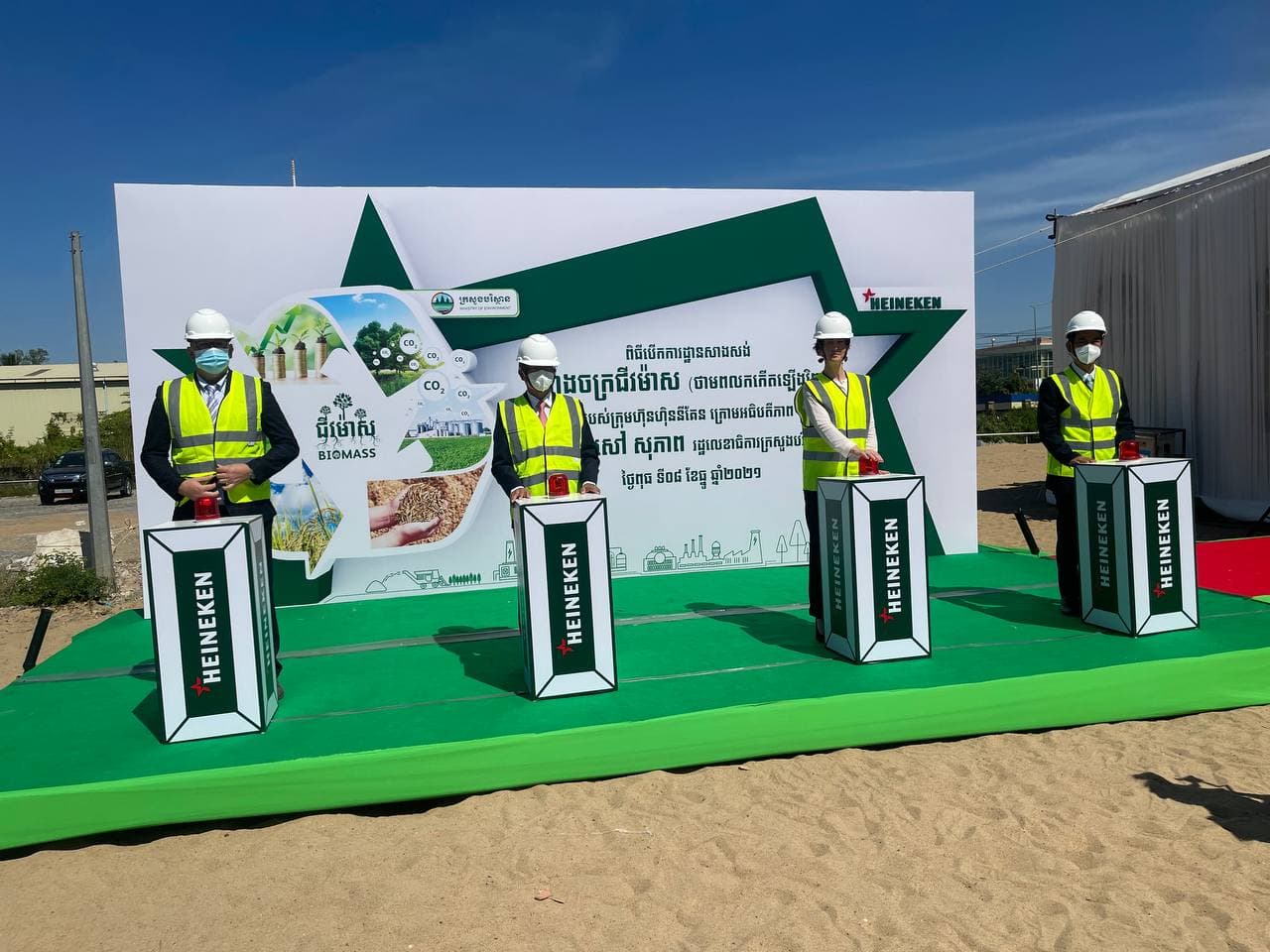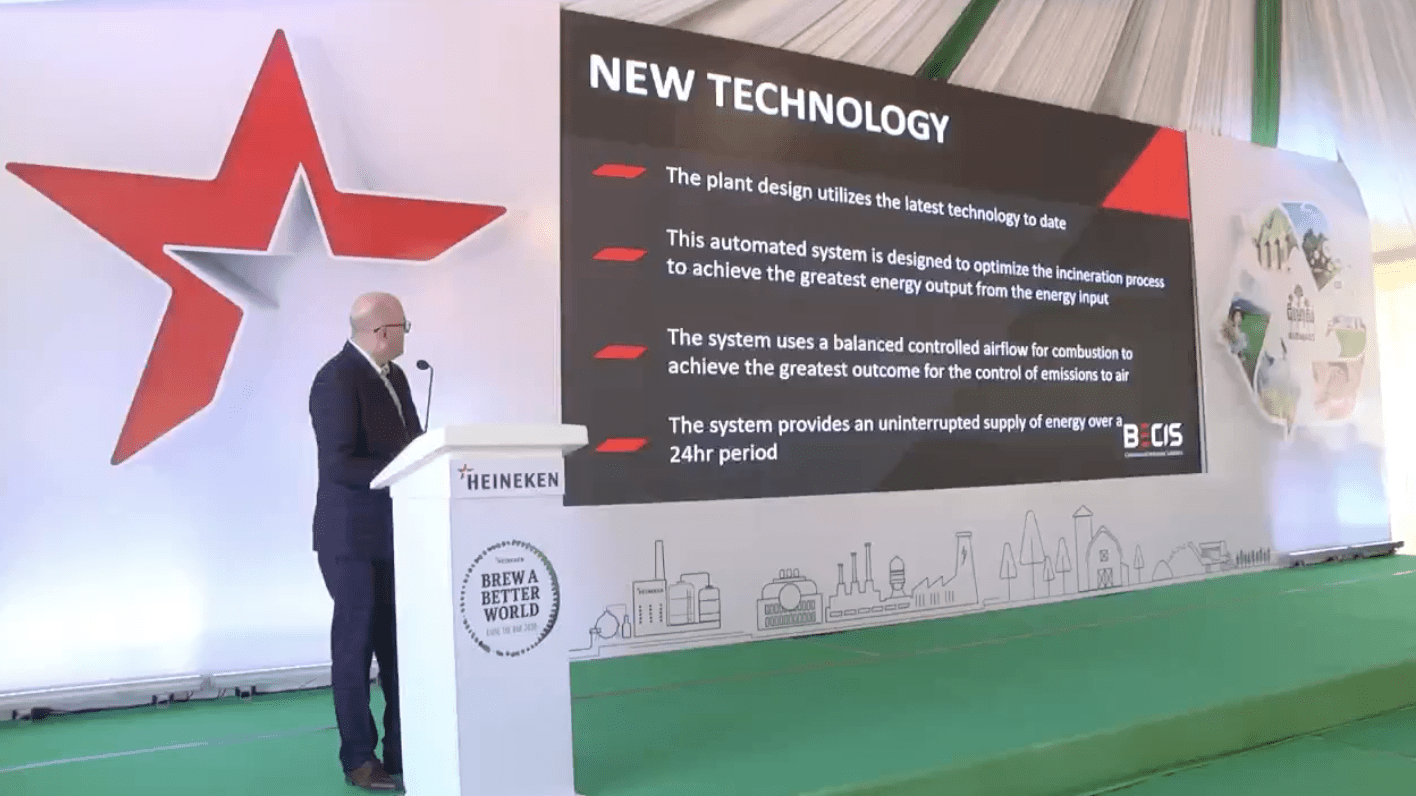NEWS HIGHLIGHTS
- BECIS 1st biomass plant project developed for Heineken in Cambodia is officially admitted as a Qualified Investment Project (QIP) by the Council for the Development of Cambodia (CDC) on 16 February 2022
- The plant will start operations in July 2022, 8 months after the groundbreaking ceremony
- With a USD 5.8M capital investment, the project creates 50 jobs and will be Cambodia’s largest Biomass Power Plant
- Coordinated by Confluences, the QIP application for BECIS biomass power plant project is part of the investment journey. Initiated in December 2021, the QIP status was obtained in 3 months.
- The CDC decision to grant BECIS biomass project the QIP status demonstrates sustainability has become key to ensure Cambodia’s competitiveness in global markets.
The Council for the Development of Cambodia (CDC) is pleased to announce BECIS 1st biomass plant project developed for Heineken in Cambodia is officially admitted as a Qualified Investment Project (QIP) by the Council for the Development of Cambodia (CDC) on the 6th of February 2022.
The Biomass factory is part of the 12 New investment projects that the CDC approved as QIP in February 2022. Since the beginning of the Year, the CDC admitted as QIP a total of 37 investment projects worth about $2.38 billion, in significant progress thanks to economic recovery despite the lingering the Covid-19 situation.
Through the “Qualified Investment Project” status (“QIP”), the investment project receives an official Final Registration Certificate, which grants it a certain number of incentives.
After a ground-breaking ceremony held on 8 December 2021, this is another important milestone in the journey of this important project for the sustainable future of the Kingdom.

Ground-Breaking Ceremony honored by the presence of the Ministry of Environment Secretary of State H.E. Sao Sopheap

BECIS Cambodia and HEINEKEN teams
An important milestone in the Kingdom journey to sustainability
When completed, this project will be Cambodia’s largest Biomass Plant.The addition of this new factory will add more than 9 MW of installed capacity to Cambodia’s existing plants.
“With a mandate to promote a responsible private sector in the Kingdom of Cambodia, and in line with our country’s commitment to sustainable development, the CDC is particularly keen to encourage the development of green projects. Biomass plants offer a great potential to reduce fuel consumption in the Kingdom. The BECIS / Heineken biomass factory is a great milestone and a perfect example in the use of renewable energy. More similar projects will help reduce greenhouse gas emissions and contribute to the climate change response which Cambodia promotes actively.” H.E. Sok Chenda Sophea, Secretary General of the Council for the development of Cambodia.
The QIP status
Coordinated by Confluences, the QIP application for BECIS biomass plant project is part of the investment journey. Initiated in December 2021, the QIP status was obtained in 3 months.
To be admitted as a QIP, the investment project was to be registered with the Council for the Development of Cambodia (CDC). At the end of the process, not only a Final Registration Certificate (FRC) is granted to the project, but also more specific investment incentives depending on the nature of the project.
The importance of the QIP status is to be understood through the New Law on Investment context. The 12 chapters and 42 articles of the New Investment Law were drafted to support the 2015-2025 Industrial Development Policy of the Royal Government of Cambodia.
Replacing the existing 1994 Law on Investment and the 2003 Law (“Former Investment Law”), the “New Investment Law” was promulgated on 15 October 2021. Aiming to provide a comprehensive legal framework to attract domestic and foreign investment, it is redefining incentives for more than a dozen business sectors. It does notably expand the range of environmentally focused organizations eligible for incentives, including environmental management and protection, biodiversity conservation, the circular economy and green energy including technology contributing to climate change adaptation and mitigation.
More specifically, the New Investment Law provides investment incentives to investment projects that: (1) contribute to skills training, research and development and innovation; (2) nurture the growth of small to medium sized enterprises (“SMEs”) by providing support to SMEs via skills training, staff incentives and investment in machinery or production equipment; (3) establish large industrial parks and commercial hubs; (4) promote more active participation by the private sector in the development of physical infrastructure; (5) promote the logistics and digital industry sectors; and (6) contribute to environmental management and protection and biodiversity conservation.

Neil Allen, General Manager of BECIS Cambodia

BECIS development in Cambodia
BECIS, the fast-growing Asian based energy solutions operator headquartered in Singapore started its operations in Cambodia in the first half of 2021 with the operational support of Confluences. (https://www.confluences.asia/case-studies/becis)
After launching projects in China, India and 5 out of 10 countries in ASEAN, and only 3 years after its foundation, BECIS started its 1st project in Cambodia with this collaboration with Heineken.
With an objective to be fully operational in July 2022, this biomass power plant will generate thermal energy for the leading international brewer’s Phnom Penh production site in Cambodia.
The plant will burn rice husks sourced from nearby Prey Veng province providing an extra market for rice farmers and millers. Burning the rice husks will generate steam to supply thermal energy to the brewery.
It is also the second renewable energy project BECIS is conducting with Heineken in the ASEAN region. (https://be-cis.com/case-study/heineken-indonesia/)
“Since our foundation 3 years ago in 2019, we have been developing more than 25 projects in 8 Asian countries with clients in 5 industry sectors. Our international growth requires seasoned local partners that can drive fast implementation and efficient licensing support on the ground. Confluences has been instrumental in BECIS’ foothold in Cambodia.” (Hannu Ikävalko, BECIS COO).
“Cambodia is a key market for BECIS in the Mekong region. Our presence in the Kingdom demonstrates our ability to serve our customers regionally in all markets in Southeast Asia. Our go-to-market strategy has been highly facilitated by our partnership with Confluences. Their assistance has been critical at every step of our implementation in the Kingdom. The QIP status is another critical milestone in this project. This will enable us to expand locally both our team and services and be positioned as the go-to energy solutions long-term partner in Cambodia.” (Neil Allen, BECIS Cambodia General Manager)
“The CDC decision to grant BECIS biomass project the QIP status demonstrates sustainability has become key to ensure Cambodia’s competitiveness in global markets. In the context of a fast-developing country, this biomass power plant and BECIS’ expertise will contribute to building a greener ground for our next generations in Cambodia. Not only are we honored as a company to have been chosen by a SEA regional leader to support his development and operations in the Kingdom, but also, we believe the implementation of more projects with ‘BECIS inside’ will impact Cambodia extremely positively.”(Soreasmey Ke Bin, CEO Confluences and Chairman of the French Chamber of Commerce Cambodia).
About the Heineken biomass factory project
Project timeline
- 8 December 2021: Ground-breaking ceremony at the Heineken brewery in Robos Angkagne Village with the presence of Environment Ministry Secretary of State Sao Sopheap and representatives from the Ministry of Mines and Energy, local authorities and business associations.
- July 2021: Factory starts operations
Facts & figures
- Capital investment: $5.8 million
- Staff: 50 employees
- Location: southeastern Phnom Penh’s Chbar Ampov district
Technical features
- Energy source: plant will burn rice husks sourced from nearby Prey Veng province
- Objective: 100% renewable thermal energy, 60% reduction on CO2 emissions in production by, saving 17,000 tonnes of CO2 per year.
The growth of Biomass plants in Cambodia
2016: 5 biomass plants, representing nearly 18 MW of installed capacity and 42 gigawatt hours of energy.
2017: +2 plants representing an additional 21 MW of biomass generation
2020: 33.57 MW of installed biomass capacity, representing 1.42 percent of the total energy mix, according to the Ministry of Mines and Energy.
The ministry is currently working on a new Power Development Plan focused more on renewable energy to reduce, but not eliminate, fossil fuel power.
About The Council for the Development of Cambodia (CDC)
Recognizing that the real economic growth necessary to achieve the country’s developmental goals lies in the development of a healthy private sector, the government undertook a program of reform to promote private sector investment.
As part of this reform program, the Law on Foreign Investment in the Kingdom of Cambodia of 1994 established the Council for the Development of Cambodia (CDC). This law made the CDC the highest decision-making level of the government for private and public sector investment. It is chaired by the Prime Minister and composed of senior ministers from related government agencies.
The Cambodian Investment Board (CIB) and the Cambodian Special Economic Zone Board (CSEZB) are the CDC’s operational arms for private sector investment.
CDC’s vision is to be the Government Investment Promotion Agency with efficient and effective work and outputs, delivering benefits to the people of Cambodia through increased investment.
Our Purpose is to manage the Cambodian Government’s private sector investment policy and help attract and retain productive private sector investment.
For more information: http://www.cambodiainvestment.gov.kh/





























Recent Comments